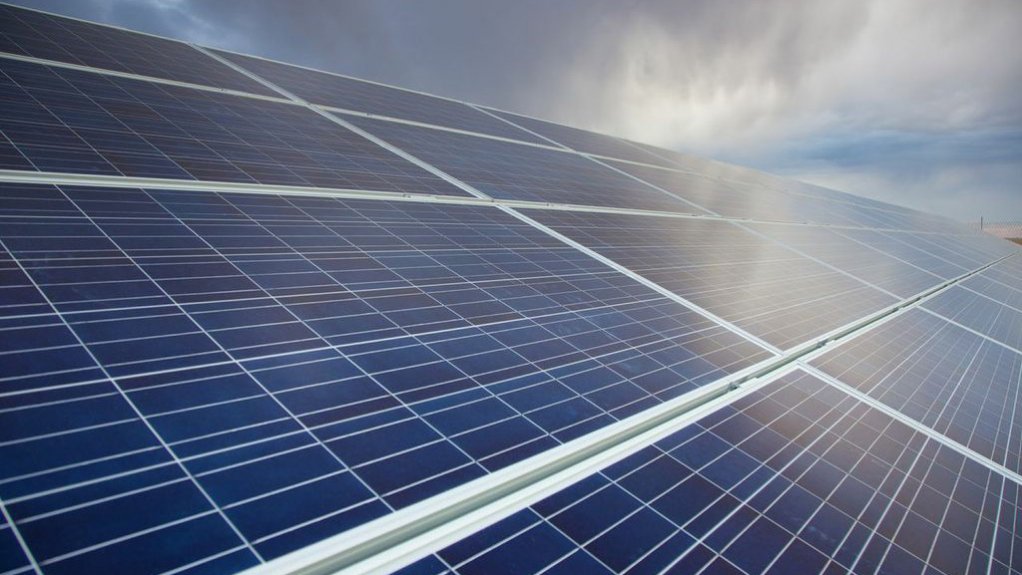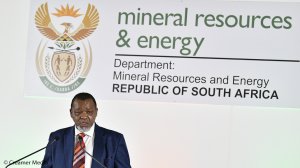In a disappointing development, Mineral Resources and Energy Minister Gwede Mantashe has announced the appointment of only five preferred bidders, with a combined capacity of 860 MW, following the evaluation of bids made during South Africa’s latest renewables procurement round.
A sixth project has also been identified as eligible and government is in discussion with the potential bidder on conditions for appointment, which, if concluded, could increase capacity of preferred projects to 1 000 MW.
All six are solar photovoltaic (PV) projects, with none of the 23 wind projects submitted under Bid Window 6 (BW6) of the Renewable Energy Independent Power Producer Procurement Programme (REIPPPP) attaining preferred-bidder status.
The low conversion rate came despite BW6’s initial allocation being raised from 2 600 MW to 4 200 MW as part of measures announced by President Cyril Ramaphosa in July to tackle what has now become extreme loadshedding.
A total of 56 wind and solar PV projects were submitted by the early-October deadline, with a combined capacity of more than 9 600 MW.
In addition, only solar projects in the North West and Free State provinces received appointment letters, with the bulk of the remaining 27 solar projects failing to secure grid access.
The projects named as preferred bids include the 150 MW Kutlwano solar power plant, the 150 MW Boitumelo solar power plant and the 120 MW Doornkop PV facility, all in the North West; as well as the 240 MW Virginia solar park and the 200 MW Good Hope solar park, in the Free State.
The IPP Office confirmed that BW6 was now formally closed except for an engagement that would take place with the one additional eligible bidder.
IPP Office head Bernard Magoro confirmed that access to the Eskom grid had emerged as a major constraint during the bidding round, with the indicative capacity available in the Western, Eastern and Northern Cape provinces at the launch of BW6 in April having subsequently been absorbed by private projects.
Magoro explained market dynamics had changed materially during the bid window, as a result of a reform allowing distributed generators below 100 MW to proceed without a licence - a cap that will be eliminated entirely in the coming months.
That reform had the “unintended consequence” of grid being reserved for private projects, which Magoro acknowledged could advance more rapidly than is possible under the REIPPPP, partly because the REIPPPP projects are backed by a government guarantee and were, thus subject to conditions relating to ownership, local content and socioeconomic development.
Eskom transmission MD Segomoco Scheepers said the Grid Code dictated that Eskom provide non-discriminatory access to the network and it could, thus, not reserve grid access for REIPPPP projects where an interest had been shown but where no financial commitment had been made.
Eskom also had no queuing system for grid access, which left the BW6 projects vulnerable, as they were unable to apply for budget quotes before being awarded preferred-bidder status, with only cost estimate letters required for bid submission.
In the event, the capacity initially indicated to be available in Eskom’s Generation Connection Capacity Assessment was no longer available by the time BW6 bidders were in a position to make such commitments.
Scheepers insisted that Eskom had both short- and long-term plans to extend and strengthen the grid, which is necessary to connect and transport much-needed new generation capacity, especially in the Cape provinces.
Eskom’s latest Transmission Development Plan points to the need for a significant acceleration in grid-related investments to facilitate the integration of 53 GW of new generation capacity, mostly renewables, over the next ten years.
Covering the period from 2023 to 2032, the latest edition of the plan, which is published yearly, points to the need for the construction of 14 218 km of new high-voltage transmission lines over the period.
It also outlines the need for the deployment of 170 transformers, with a capacity of 105 865 MVA, along with 40 capacitors and 52 reactors to support stable and reliable grid operations and the integration of new generation capacity and load centres.
Department of Mineral Resource and Energy director-general Jacob Mbele said the market reforms had significant implications for the REIPPPP, which has hitherto been held up to be a world-class programme despite a seven-year disruption triggered in 2015 when the then Eskom leadership refused to sign power purchase agreements with IPPs.
However, he insisted that there was still a need for a national procurement programme and that government would, thus, continue to implemented the REIPPPP.
Magoro said the programme would probably need to be redesigned in light of the new market dynamics and indicated that the new model would probably need to be debated by various stakeholders, including government and the National Energy Regulator of South Africa.
He reported that the six solar projects had been bid at prices higher than those achieved during BW5 – a round that has subsequently experienced serious delays partly because the tariffs had been submitted ahead of the surge in costs associated with Russia’s invasion of Ukraine and several Covid lockdowns in China.
Magoro said the weighted average price for the six projects was 49.05c/kWh, compared with the 42c/kWh (45c/kWh today) achieved under BW5. The lowest bid was 46.95c/kWh and the highest 54.8c/kWh.
The 8% tariff increase, which was widely expected, was the first such increase under the REIPPPP, which had previously seen tariffs decline in each round since its launch in 2011.
The projects, which have a combined investment value of 12.1-billion, have until April to reach commercial close and begin construction.
EMAIL THIS ARTICLE SAVE THIS ARTICLE ARTICLE ENQUIRY
To subscribe email subscriptions@creamermedia.co.za or click here
To advertise email advertising@creamermedia.co.za or click here














